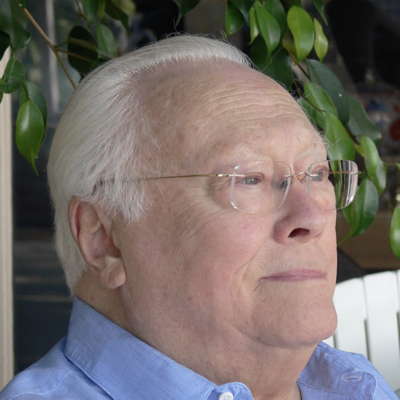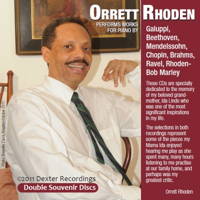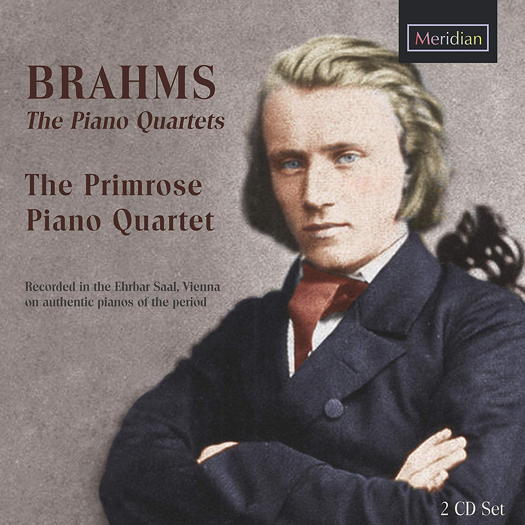 VIDEO PODCAST: Find out about composers from unusual places, including Gerard Schurmann, Giya Kancheli, Nazib Zhiganov and Nodar Gabunia, about singing in cars, and meet Jim Hutton from the RLPO and some of our regular contributors.
VIDEO PODCAST: Find out about composers from unusual places, including Gerard Schurmann, Giya Kancheli, Nazib Zhiganov and Nodar Gabunia, about singing in cars, and meet Jim Hutton from the RLPO and some of our regular contributors.
 DISCUSSION: What is a work? John Dante Prevedini leads a discussion about The performing artist as co-creator, including contributions from Halida Dinova, Yekaterina Lebedeva, Béla Hartmann, David Arditti and Stephen Francis Vasta.
DISCUSSION: What is a work? John Dante Prevedini leads a discussion about The performing artist as co-creator, including contributions from Halida Dinova, Yekaterina Lebedeva, Béla Hartmann, David Arditti and Stephen Francis Vasta.
 SPONSORED: CD Spotlight. Most Remarkable - Jamaican pianist Orrett Rhoden, heard by Bill Newman.
SPONSORED: CD Spotlight. Most Remarkable - Jamaican pianist Orrett Rhoden, heard by Bill Newman.
All sponsored features >>

Highly Enjoyable
PATRICK MAXWELL listens to
Brahms from The Primrose Piano Quartet
'... the playing is meticulous and the overall effect magnificent.'
It would be easy to believe that Johannes Brahms was living in a time that was bound to create the most brilliant music, with the volatile German political climate, the influence of Beethoven and Schubert, and the high-point of the Romantic era, being the perfect setting for music such as that he produced. One could say that perhaps it was Mahler who occupied this spot, composing on the cusp of modernism, and both of them fully lived up to the times they were living in.
The Piano Quartets of Brahms in this new, unique recording by the Primrose Piano Quartet are set firmly in the Romantic age, but they nevertheless display Brahms' most virtuosic skills, and his distinctly European style. For this new record, originality has been made the central theme, with three nineteenth century pianos used to make a historically accurate performance, and recorded in the Ehrbar Hall in Vienna, which Brahms was known to have frequented during his life.
The CD starts with the Third Quartet, on the Ehrbar instrument, in the E flat key that was described by music critic Max Kalbeck as being 'like an angel from heaven'. The solemn first movement is tenderly played, although the piano does not share the brilliance of the Steinway Grand that was to become the model of choice in the years after Brahms. The soaring second movement lets the string sound come through in more detail, and has a more modern theme that perhaps does not fit the instrument as well as more modern interpretations have suggested. Originality is to be lauded, however, and the energetic ending is meticulously performed. The Andante third movement is sonorous and exquisite, and all players give the beautiful melody its full due. The cello playing at the beginning from Andrew Fuller is sumptuous, and when Susanne Stanzeleit joins in on the violin with Dorothea Vogel on the viola, the development is a sound to behold.
Listen — Brahms: Andante (Piano Quartet No 3 in C minor, Op 60)
(CD1 track 3, 1:04-2:04) © 2019 Meridian Records :
The Finale, Andante Comodo, is agitated, with a series of interjections from the piano accompanying the different ideas of the strings around a central minor theme that has echoes of the third movement's tune. The anxious feel of the music is made clear in the ascending quavers on the violin that lead to a seemingly unresolved cadence that continues to build until the calm, layered theme returns, with the spiraling piano part overhead.
The Streicher piano is used for the Quartet No 1, which starts with a simple piano theme taken by all instruments in a bucolic and effervescent beginning, which many instruments taking of the same tune as a gradual growth in intensity leads into a conversation between strings and piano as the chords change and grow back towards the original theme, before a new, more foreboding melody is increased. This is magnificently played, and the piano is more suited to the music that displays a fast-changing set of emotions.
Listen — Brahms: Andante (Piano Quartet No 1 in G minor, Op 25)
(CD1 track 5, 0:01-0:59) © 2019 Meridian Records :
The Intermezzo starts in a haunting way, with a cello keeping a repetitive bass line. This soon morphs into a beautiful melody on all instruments that seems to represent change, sharply and swiftly contrasted with the darker beginning. The Andante con moto that comes after this is a pastoral piece that combines all the instruments in a theme that displays a quintessential Romantic structure. The tempestuous Rondo alla Zingarese, the so-called 'Gypsy Rondo', changes to the more active themes of previous movements, and the piano passages are meticulously carried off by John Thwaites. The pizzicato section precedes a triumphant and almost monophonic theme that is the summation of a triumphant, and highly Romantic, movement. It is finished by a dramatic finale that is a final climax to the seething energy and tension throughout.
The Second Quartet is last on these discs, and starts with a fiery Allegro non troppo that sparkles with an energy that is mixed with the melancholy theme, with the Blüther piano, once a highly used instrument, making full use of the opulent part. The tender second movement is perhaps the most subdued of the disc, and is performed accordingly. The Scherzo displays a growing melody that is passed between the instruments, and has an almost jokingly classical motif. The sprightly Finale is finished with aplomb, and the invigorating finish expertly pulled off.
Listen — Brahms: Finale: Allegro (Piano Quartet No 2 in A, Op 26)
(CD2 track 4, 10:02-11:02) © 2019 Meridian Records :
The Primrose Piano Quartet has produced a disc that is both highly enjoyable and enlightening, opening a metaphorical door to some of Brahms' most popular music during his Viennese days. Although perhaps the push for originality does not always have the best musical effect, the playing is meticulous and the overall effect magnificent.
Copyright © 11 December 2019
Patrick Maxwell,
Buckinghamshire, UK

CD INFORMATION - BRAHMS: THE PIANO QUARTETS
FURTHER INFORMATION - MERIDIAN RECORDS
CD INFORMATION - JOHANNES BRAHMS


